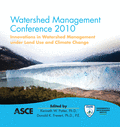Incorporating Climate Change Impacts into the Columbia River Treaty 2014/2024 Review
Publication: Watershed Management 2010: Innovations in Watershed Management under Land Use and Climate Change
Abstract
The U. S. Army Corps of Engineers (USACE) is undertaking a series of studies to support a pending decision by the United States pertaining to the future of the Columbia River Treaty with Canada. The Treaty, ratified in 1964, is an agreement between the United States and Canada to provide flood control and power benefits for both countries. In these studies, information will be developed and alternatives evaluated that provide the basis for long-term recommendations pertaining to the future of the Treaty. Assumptions drawn regarding potential future climate changes and associated hydrologic impacts could have very significant influence on alternative Treaty strategies. For several decades climate scientists have provided an increasing array of knowledge and information on climate impacts. Climatic phenomena, such as summer and wintertime droughts, floods and wind storms, have greatly affected the Pacific Northwest in the last several decades. Observed data in the West is already showing signs of global warming — reductions in spring snowpack, earlier spring snowmelt, increased runoff in winter and less runoff in summer. These shifts may potentially increase flood risks in the early spring, and change the timing and volume of water in spring and early summer available for reservoir refill. Different parts of a basin may be affected differently by warming so that high elevation snowpack may experience minor impacts while low elevation sites may experience major changes Water resource managers have struggled to understand how to incorporate the knowledge provided by science into their planning and operations. This paper discusses a decision-making framework to bridge the gap between climate science and water management for the Columbia River Treaty 2014/2024 Review. The decision framework must be robust enough to accommodate risk characterization, screening and prioritization while allowing for adaptive management strategies that avoid maladaptations. Maladaptions are decisions that prevent or constrain the ability of others to manage, reduce or otherwise adapt to the effects of climate change in the future. Modeling systems used by the team will be capable of incorporating multi-objective analyses and alternative assessments running numerous future climate scenarios in physically based hydrologic, reservoir and hydraulic models that will ultimately support the decision-making framework.
Get full access to this article
View all available purchase options and get full access to this chapter.
Information & Authors
Information
Published In
Copyright
© 2010 American Society of Civil Engineers.
History
Published online: Apr 26, 2012
ASCE Technical Topics:
Authors
Metrics & Citations
Metrics
Citations
Download citation
If you have the appropriate software installed, you can download article citation data to the citation manager of your choice. Simply select your manager software from the list below and click Download.
